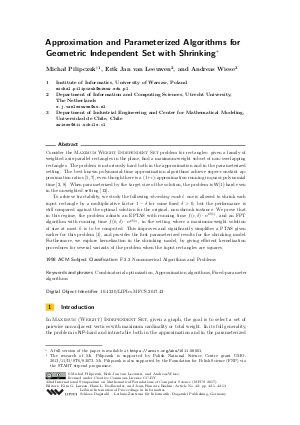Approximation and Parameterized Algorithms for Geometric Independent Set with Shrinking
Authors Michal Pilipczuk, Erik Jan van Leeuwen, Andreas Wiese
-
Part of:
Volume:
42nd International Symposium on Mathematical Foundations of Computer Science (MFCS 2017)
Part of: Series: Leibniz International Proceedings in Informatics (LIPIcs)
Part of: Conference: Mathematical Foundations of Computer Science (MFCS) - License:
 Creative Commons Attribution 3.0 Unported license
Creative Commons Attribution 3.0 Unported license
- Publication Date: 2017-12-01
File

PDF
LIPIcs.MFCS.2017.42.pdf
- Filesize: 0.56 MB
- 13 pages
Document Identifiers
Subject Classification
Keywords
- Combinatorial optimization
- Approximation algorithms
- Fixed-parameter algorithms
Metrics
- Access Statistics
-
Total Accesses (updated on a weekly basis)
0Document
0Metadata
Abstract
Consider the Maximum Weight Independent Set problem for rectangles: given a family of weighted axis-parallel rectangles in the plane, find a maximum-weight subset of non-overlapping rectangles. The problem is notoriously hard both in the approximation and in the parameterized setting. The best known polynomial-time approximation algorithms achieve super-constant approximation ratios [Chalermsook & Chuzhoy, Proc. SODA 2009; Chan & Har-Peled, Discrete & Comp. Geometry, 2012], even though there is a (1+epsilon)-approximation running in quasi-polynomial time [Adamaszek & Wiese, Proc. FOCS 2013; Chuzhoy & Ene, Proc. FOCS 2016]. When parameterized by the target size of the solution, the problem is W[1]-hard even in the unweighted setting [Marx, ESA 2005].
To achieve tractability, we study the following shrinking model: one is allowed to shrink each input rectangle by a multiplicative factor 1-delta for some fixed delta > 0, but the performance is still compared against the optimal solution for the original, non-shrunk instance. We prove that in this regime, the problem admits an EPTAS with running time f(epsilon,delta) n^{O(1)}, and an FPT algorithm with running time f(k,delta) n^{O(1)}, in the setting where a maximum-weight solution of size at most k is to be computed. This improves and significantly simplifies a PTAS given earlier for this problem [Adamaszek, Chalermsook & Wiese, Proc. APPROX/RANDOM 2015], and provides the first parameterized results for the shrinking model. Furthermore, we explore kernelization in the shrinking model, by giving efficient kernelization procedures for several variants of the problem when the input rectangles are squares.
Cite As Get BibTex
Michal Pilipczuk, Erik Jan van Leeuwen, and Andreas Wiese. Approximation and Parameterized Algorithms for Geometric Independent Set with Shrinking. In 42nd International Symposium on Mathematical Foundations of Computer Science (MFCS 2017). Leibniz International Proceedings in Informatics (LIPIcs), Volume 83, pp. 42:1-42:13, Schloss Dagstuhl – Leibniz-Zentrum für Informatik (2017)
https://doi.org/10.4230/LIPIcs.MFCS.2017.42
BibTex
@InProceedings{pilipczuk_et_al:LIPIcs.MFCS.2017.42,
author = {Pilipczuk, Michal and van Leeuwen, Erik Jan and Wiese, Andreas},
title = {{Approximation and Parameterized Algorithms for Geometric Independent Set with Shrinking}},
booktitle = {42nd International Symposium on Mathematical Foundations of Computer Science (MFCS 2017)},
pages = {42:1--42:13},
series = {Leibniz International Proceedings in Informatics (LIPIcs)},
ISBN = {978-3-95977-046-0},
ISSN = {1868-8969},
year = {2017},
volume = {83},
editor = {Larsen, Kim G. and Bodlaender, Hans L. and Raskin, Jean-Francois},
publisher = {Schloss Dagstuhl -- Leibniz-Zentrum f{\"u}r Informatik},
address = {Dagstuhl, Germany},
URL = {https://drops.dagstuhl.de/entities/document/10.4230/LIPIcs.MFCS.2017.42},
URN = {urn:nbn:de:0030-drops-80917},
doi = {10.4230/LIPIcs.MFCS.2017.42},
annote = {Keywords: Combinatorial optimization, Approximation algorithms, Fixed-parameter algorithms}
}
Author Details
References
- Anna Adamaszek, Parinya Chalermsook, and Andreas Wiese. How to Tame Rectangles: Solving Independent Set and Coloring of Rectangles via Shrinking. In Proc. APPROX/RANDOM 2015, volume 40 of LIPIcs, pages 43-60. Schloss Dagstuhl, 2015. URL: http://dx.doi.org/10.4230/LIPIcs.APPROX-RANDOM.2015.43.
- Anna Adamaszek and Andreas Wiese. Approximation schemes for maximum weight independent set of rectangles. In Proc. FOCS 2013, pages 400-409. IEEE, 2013. URL: http://dx.doi.org/10.1109/FOCS.2013.50.
- Anna Adamaszek and Andreas Wiese. A QPTAS for maximum weight independent set of polygons with polylogarithmically many vertices. In Proc. SODA 2014, pages 645-656. SIAM, 2014. URL: http://dx.doi.org/10.1137/1.9781611973402.49.
- Jochen Alber and Jiří Fiala. Geometric separation and exact solutions for the parameterized independent set problem on disk graphs. J. Algorithms, 52(2):134-151, 2004. URL: http://dx.doi.org/10.1016/j.jalgor.2003.10.001.
-
Parinya Chalermsook and Julia Chuzhoy. Maximum independent set of rectangles. In Proc. SODA 2009, pages 892-901. SIAM, 2009.

- Timothy M. Chan. Polynomial-time approximation schemes for packing and piercing fat objects. Journal of Algorithms, 46(2):178-189, 2003. URL: http://dx.doi.org/10.1016/S0196-6774(02)00294-8.
- Timothy M. Chan and Sariel Har-Peled. Approximation algorithms for maximum independent set of pseudo-disks. Discrete &Comp. Geometry, 48(2):373-392, 2012. URL: http://dx.doi.org/10.1007/s00454-012-9417-5.
- Julia Chuzhoy and Alina Ene. On approximating maximum independent set of rectangles. In Proc. FOCS 2016, pages 820-829. IEEE, 2016. URL: http://dx.doi.org/10.1109/FOCS.2016.92.
- Rod G. Downey and Michael R. Fellows. Fixed-parameter tractability and completeness II: On completeness for W[1]. Theoretical Computer Science, 141(1):109-131, 1995. URL: http://dx.doi.org/10.1016/0304-3975(94)00097-3.
- Thomas Erlebach, Klaus Jansen, and Eike Seidel. Polynomial-time approximation schemes for geometric intersection graphs. SIAM J. on Computing, 34(6):1302-1323, 2005. URL: http://dx.doi.org/10.1137/S0097539702402676.
- Sariel Har-Peled. Quasi-polynomial time approximation scheme for sparse subsets of polygons. In Proc. SOCG 2014, pages 120-129. ACM, 2014. URL: http://dx.doi.org/10.1145/2582112.2582157.
- Dániel Marx. Efficient approximation schemes for geometric problems? In Proc. ESA 2005, volume 3669 of LNCS, pages 448-459. Springer, 2005. URL: http://dx.doi.org/10.1007/11561071_41.
- Dániel Marx and Michał Pilipczuk. Optimal parameterized algorithms for planar facility location problems using Voronoi diagrams. In Proc. ESA 2015, volume 9294 of LNCS, pages 865-877. Springer, 2015. URL: http://dx.doi.org/10.1007/978-3-662-48350-3_72.
- Michał Pilipczuk, Erik Jan van Leeuwen, and Andreas Wiese. Approximation and parameterized algorithms for geometric independent set with shrinking. CoRR, abs/1611.06501, 2016. URL: http://arxiv.org/abs/1611.06501.
- Andreas Wiese. Independent set of convex polygons: From n^ε to 1+ε via shrinking. In Proc. LATIN 2016, volume 9644 of LNCS, pages 700-711. Springer, 2016. URL: http://dx.doi.org/10.1007/978-3-662-49529-2_52.
- David Zuckerman. Linear degree extractors and the inapproximability of max clique and chromatic number. Theory of Computing, 3:103-128, 2007. URL: http://dx.doi.org/10.4086/toc.2007.v003a006.
